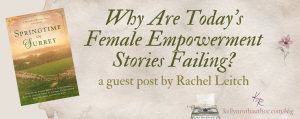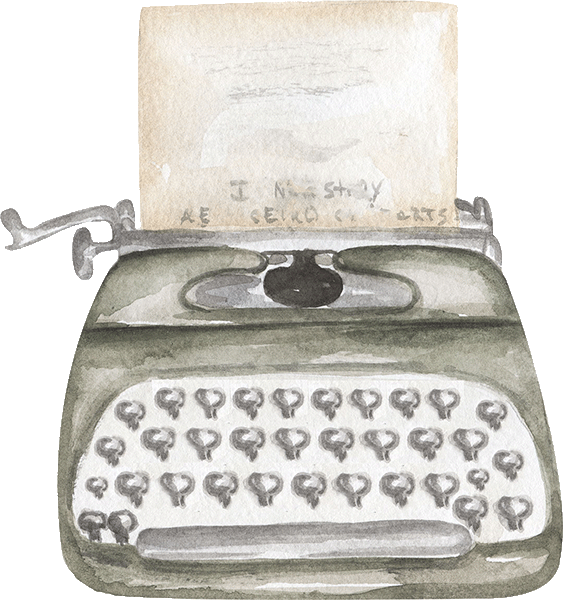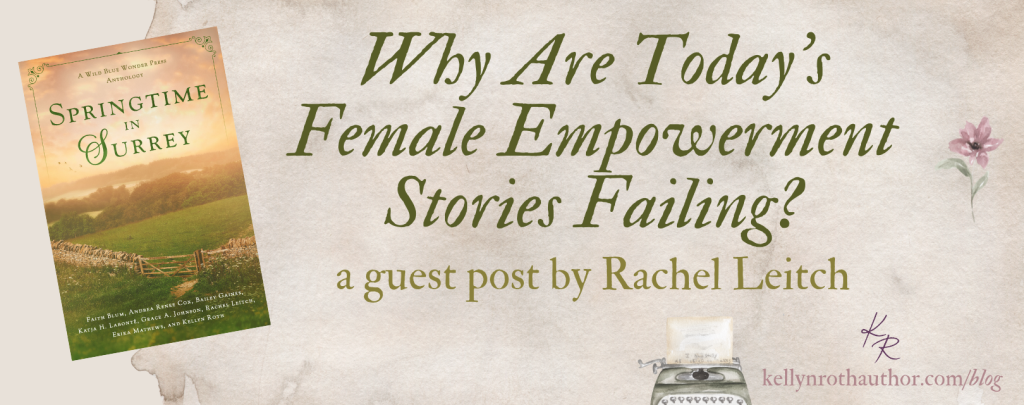
Today I’m sharing a guest post by Rachel Leitch which talks about female empowerment and the way those stories are just … well, they’re not working. (At some point I should probably share my thoughts on this, but I’ve never really gotten around to it. Much like many other things. Meh. ‘Tis a chore for another day.)
For now, enjoy this post by Rachel Leitch!
(Also, don’t forget to preorder Springtime in Surrey!)

Why Are Today’s Female Empowerment Stories Failing?
 I’m Rachel Leitch, and I’m so honored to chat with you on Kellyn’s blog! I’m the author of The Odd Duck Society in Springtime in Surrey. One of the things I love most about The Odd Duck Society and the anthology as a whole was the ability we had to explore female characters in a unique and diverse way.
I’m Rachel Leitch, and I’m so honored to chat with you on Kellyn’s blog! I’m the author of The Odd Duck Society in Springtime in Surrey. One of the things I love most about The Odd Duck Society and the anthology as a whole was the ability we had to explore female characters in a unique and diverse way.
Female empowerment stories are very close to my heart. If you search “female empowerment” on Goodreads, it pulls up 1,616 results. If we have 1,616 books on just one search, shouldn’t today’s women feel empowered?
Yet we don’t. In 2020, the Pew Research Center reported 46% (nearly half) of Americans did not believe feminism was empowering.
It’s not just “out there,” either. A Barna Group study in 2012 found that 31% of women say they are resigned to low expectations at church. “Roughly one out of every eight women feel under-appreciated by their church (13%) and one out of nine believe they are taken for granted (11%). Although these represent small percentages, given that about 70 million Americans qualify as churched adult women, this amounts to millions of women in the U.S. today who feel discouraged by their experiences in churches.”
How can a woman feel less than empowered in a group of people who hold the truth about her value? How can she still feel that way with over 1,616 books saying otherwise?
Because our female empowerment stories aren’t working.
The 2019 film Captain Marvel, for instance, was marketed as a female empowerment film and was listed as one of the most anticipated movies of the year. However, I came out of it rolling my eyes and searching for something else to watch.
It wasn’t just me. Rotten Tomatoes, a popular film reviewing website, places Captain Marvel at 79% by their critics and 45% by audience polls (although audiences can be fickle).
Despite the abundance of “empowering” stories, women are no more empowered than before, and, in some cases, are actually less empowered. Despite the common belief, this deficit isn’t because of a lack of empowering stories.
It’s because we no longer know what empowerment means.
Why is female empowerment important?
Per Merriam-Webster, empowerment is “the power, right, or authority to do something.” To empower is “to promote the self-actualization or influence of.”
The purpose of female empowerment stories is to help women realize their full potential and influence, and to remove whatever mental or physical restraints hold them back from it.
We have a personal relationship with the God Who planted that potential and power deep in the heart of every woman. “He has made everything appropriate in its time. He has also put eternity in their hearts, but no one can discover the work God has done from beginning to end.” (Ecclesiastes 3:11 CSB) We have committed to writing stories that reflect our Creator’s image, stories that are infused with truth and beauty.
Yet millions of women have resigned themselves to low expectations and being taken for granted.
Our 1,616 empowerment stories aren’t doing what they’re meant to do. Why are today’s female empowerment stories failing? Is there any way to bring them back?
Today’s female empowerment stories present a false enemy.
To return to my Captain Marvel example, Carol Danvers is frequently talked up as a “rogue soldier.” She follows her heart and that’s supposed to be a wonderful thing.
But we have absolutely no idea who or what she’s fighting against.
Is she fighting her superior? Her corrupt home planet’s system? Her own emotions? The male SHIELD agent trying to help her?
We don’t know. And Carol fights all of those things throughout the movie, forcing them all to submit and become lapdogs to her confused grand plan.
By the end of the film, we still have no idea who the real enemy was.
And since stories are meant to depict truth, we have no idea who the real enemy is in our own lives.
Men? Government? Emotions? Or maybe there’s no enemy and we’re all just fighting. Who knows?
You can’t fight a battle if you don’t know who you’re fighting. As a result, many good men and women are becoming victims of a war they never needed to fight.
If you don’t know who you’re fighting, you will ultimately lose.
Since a woman’s potential and influence is given by God, the enemy of empowerment is Satan. Satan is a master of throwing false enemies in the way so we will shift our focus just long enough for him to perform his sleight of hand. If he keeps us fighting the wrong enemy, he knows he can ultimately manipulate us into destroying each other.
A true female empowerment story unmasks the true enemy. It recognizes that beneath any physical or emotional enemy lies a sin nature capitalized upon by Satan. It becomes more about fighting sin and our own darkness than about destroying cardboard cutouts.
The film Black Panther does this very well by placing Nakia, Shuri, and Okoye alongside other men, other women, and even people they thought were their enemies. They’re not fighting the usurper intent on stealing the throne so much as their own selfishness and fear that led them to this point. It peels back the layers, discarding false cardboard enemies and gets to the sin nature behind it all, whether or not it intended to.
Today’s female empowerment stories disregard femininity and diversity.
“I can do anything a boy can do. And I can do it better.”
It might be true. But when today’s stories send a girl in to do a boy’s job, they do two things.
First, it implies that a girl has to act masculine—be a man—to be valuable. It walks us around in a great big circle. In trying to prove that a woman is valuable, we prove the very opposite—that femininity is a weakness, and if you want to have any value, you have to be as masculine as you can.
That’s not to say that a woman can’t fight. That’s not to say she can’t defy expectations and social norms, and in a number of situations, she absolutely should. But she shouldn’t have to sacrifice the things that make her a woman to do so.
Secondly, it sets up a one-size-fits-all tough girl. It ignores all the nuances and differences that make a woman beautiful—whether that be in appearance, ability, passion, or personality. A woman shouldn’t have to sacrifice the things that make her unique to be valuable.
A true female empowerment story values a woman just because she’s herself, not because she can kick and punch and claw her way out of a situation. A woman is valuable because she is hand-crafted by God. Maybe she’s been hand-crafted to fight really well, maybe not. It doesn’t affect her value.
A true female empowerment story recognizes that there are different types of women and different ways to fight and it celebrates them all.
Today’s female empowerment stories try too hard, yet fail to tell good stories.
How can it be a problem to try too hard?
Once again, we turn to Captain Marvel. From the first teaser trailer onwards, start to finish, the movie was hyped up as a female empowerment story. It built high expectations and then failed to deliver.
It simply was not a well-told story. It took many convenient shortcuts, tacking on a new superpower whenever Carol needed out of a situation. It gave the characters no development or emotion, and it gave the audiences no reason to care.
Which begs the question—why did they have to tell the audience it was a female empowerment story? If female empowerment was truly so central to the story, wouldn’t it have told itself?
If I draw a dog, and have to explain to everyone else around me that it’s a dog, I probably didn’t draw a very good dog. In the same way, if I write a story, and have to explain to everyone else around me that it’s a female empowerment story, I probably haven’t written the best story I can.
If I can’t put in the time and effort to tell a good story, it won’t matter how empowering my story is. A second-rate story will produce second-rate results.
If I celebrate women with a second-rate story, then women are led to believe they are worthy of the second-rate, nothing more. In a roundabout way, that leads them to believe that they themselves are second-rate.
A true female empowerment story tells a good story first. The author puts time and energy and thought and effort into all the aspects of the story. Which naturally includes female representation as well.
Conclusion
Throughout this entire discussion, I’ve failed to present my best example—a woman far stronger than any warrior in a movie could be.
I never had to be told that my mother is a strong woman. I saw it on my own. She is the definition of empowerment. She recognizes her full potential and influence and Who it comes from, and she values that very deeply. She stays focused on the real battle at hand. She is fierce and strong, and she never relents in the face of things no woman should ever have to deal with.
She’s not the only one. Every day—in my church, in my workplace, in my family and friends—I watch women fight hard and defy the low expectations placed on us.
No book or movie has ever given me the sense of empowerment that I receive from watching them battle.
That’s why I want to write female empowering stories.
Because these women deserve to be honored. More than that, they deserve the very best. So does the One Who created them and enables them to be the warriors they are every single day.
And that is why we do it. That’s why we’re reading this article, why we even care if those 1,616 stories are working or not. Because we want to honor the stories being told and to empower the next generation of stories.
Perhaps we will make the 1,617th female empowerment story do just that.
I look forward to sharing The Odd Duck Society with you and I hope that you find it empowering. I’m so excited to come alongside other authors who have a heart for empowering every woman.
About the Writer of this Blog Post
Rachel Leitch lives her own adventure in northern Indiana, with her parents, three sisters, two brothers, and a dog who thinks he’s the hero of her story. She writes young adult historicals with a dash of adventure or a spark of magic. When she’s not hidden away writing, she’s trying to fit all her reads on her shelf in a somewhat organized manner, obsessing over character arcs, drinking chai, daydreaming at the piano, or teaching students to be just as bookish as she is. In all her adventures, she learns how to shine brighter for the Father of Lights.

TTFN!
~Kell~
P.S.
Well, what do you think? This is obviously a topic rife with varying interpretation and discussion points! I think you could approach it from a million different angles, so I’m curious as to what you thoughts will be. As mentioned, Springtime in Surrey will be releasing soon! Can’t wait to share these eight women’s fiction stories with you that do serve to show Godly women interacting in varying situations!
Don’t forget to preorder Springtime in Surrey now!

Are you interested in getting to know me & my books better?
I want to invite you to my super secret club. I mean, it’s not really a secret, because I’m telling you about it now, but here goes.
Join Mrs. Roth’s Society Column, my street team! We’d love to have you along for the ride!





18 Responses
Okay, wow. I’ll be honest, I did not expect this post to be THAT good. Female empowerment is so often twisted and warped until it’s, well, second-rate (to quote you, Rachel) and anti-woman. So the way you broke this down was SO refreshing!
I especially love this: “Since a woman’s potential and influence is given by God, the enemy of empowerment is Satan.” LIKE YES. THANK YOU.
Empowering women does not mean disempowering men or society or whatever. Empowering women does not mean exalting women above others or forcing them to be something they’re not. You can’t solve identity issues and gender inequality with more division and stereotyping. It means, plain and simple, finding your worth as a woman (and a person in general) in God, the One Who created you infinitely valuable and full of potential to serve Him, rather than listening to the lies of the devil that tell you you’re worthless or less-than or unvaluable as a woman.
Anyway. *steps off her soapbox* I really enjoyed this post, and I can’t wait to see more stories that celebrate women for who they are – not only beautiful and feminine but created by God in His image! Thank you so much for writing, Rachel, and for sharing, Kell! <3
Love this comment, Grace! You’re so right! We need less of the whole “women need empowered to be whoever they want!” and more “women need to be empowered (encouraged, even, more accurately?) to take responsibility for their own relationship with God – and pursue Him wholeheartedly.”
Thank you so much, Grace! I love your thoughts on it. It’s definitely a topic that I am very passionate about.
YES, AMEN! Amazing post, Rachel! I hate how most female empowerment stories encourage women to be as masculine as possible, which is completely contradictory, like you were saying. Femininity is viewed as a weakness, when in fact it is valuable and worthy. I can’t wait to read “The Odd Duck Society” – I know I will love it! <3
Thanks for your comment, Saraina! I’m so with you … ’cause we need more femininity!
Thank you, Saraina! I’m glad this resonated with you.
Personally, the ‘tough girl’ stereotype has always bugged me. Not that some women are that way, or could be; but Rachel is right. It’s not a ‘one-size-fits-all’. And I’d love to see more stories explore what ‘strong’ really means, especially in all its nuances and complexities.
Absolutely! After all, strength is not all about physical strength or being emotionless … and in fact, being emotionless can be a weakness in some areas!
Exactly! I mean, even King David wept and showed emotion from time to time, and he was supposed to be a tough, warrior king!
Ooh, good point, Lillian! I’m a hard sell there, because I absolutely adore the tough girl trope. I tend to relate to them more. But I do agree that it can be very one size fits all. I love seeing tough girls who are tough because they are girls, because they have unique abilities only they alone have, instead of just because they had to “keep up” with their male counterparts. (Not to use another Marvel example, but I feel like Black Widow evolved a lot in that area over time.)
Thanks! Oh, that’s cool. Who’s your favorite ‘tough girl’ character?
Exactly! I also liked Rey (from the Force Awaken movie), and how they balanced her ‘toughness’ with emotions and fear 🙂